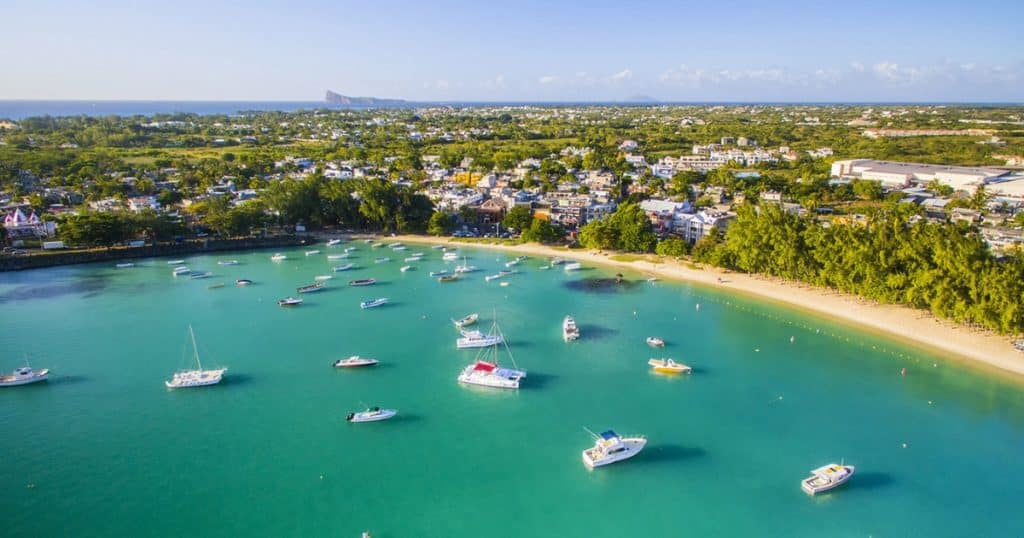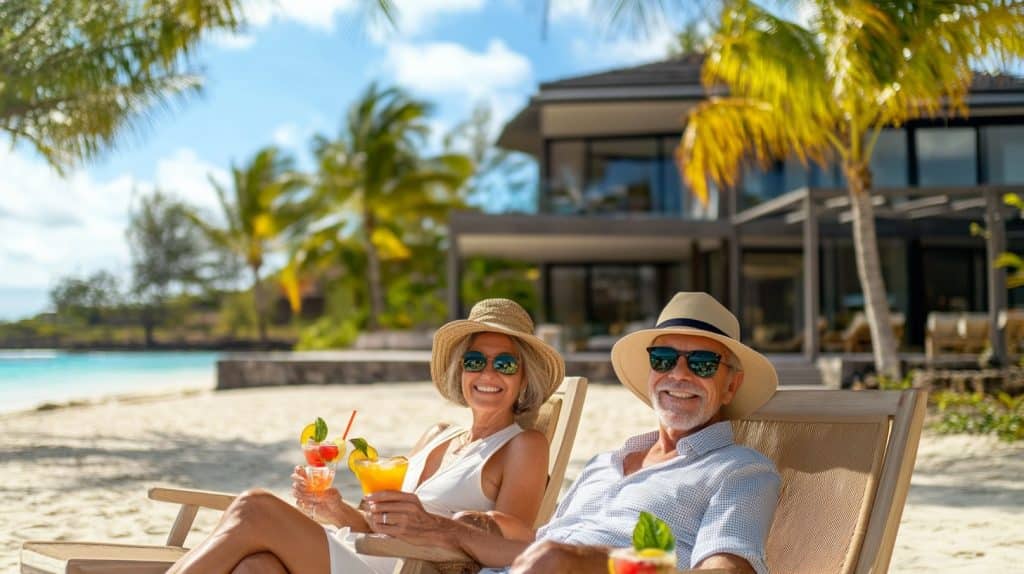Mauritius, a true pearl of the Indian Ocean, is returning to its status as a leading tourist destination in 2024. After a difficult period marked by the COVID-19 pandemic, the tourism sector, a major pillar of the Mauritian economy, is experiencing a promising resurgence. This recovery not only contributes to revitalizing the economy, but also plays a central role in the country’s sustainable growth plan.
A key sector in the economic recovery
Tourism has always been one of the driving forces of the Mauritian economy, and in 2024, it is picking up again. With an estimated GDP growth of 6.5%, largely supported by the dynamism of tourism, the island is preparing to welcome an ever-increasing flow of visitors. This recovery is not only a sign of resilience, but also a long-term development strategy for Mauritius, which aims to capitalise on the beauty of its landscapes and the quality of its infrastructure.
Eloquent figures
The year 2024 marks the full recovery of tourism, with projections echoing pre-pandemic levels. The Mauritian government expects its tourism sector to return to full capacity, with revenues projected to reach billions of rupees. This translates into strong demand in the hospitality, catering, and leisure sectors, creating thousands of jobs and boosting the local economy.
| Year | Number of Visitors (in millions) | Revenue Generated (in billions of USD) | Hotel Occupancy Rate (%) | Share of GDP (%) |
|---|---|---|---|---|
| 2019 (pre-pandemic) | 1.3 | 1.7 | 82 | 24 |
| 2020 (pandemic) | 0.4 | 0.5 | 20 | 8 |
| 2023 (partial recovery) | 0.9 | 1.2 | 65 | 18 |
| 2024 (full recovery) | 1.2 | 1.6 | 78 | 22 |
A strategic positioning
Mauritius is banking on quality and sustainable tourism, offering high-end experiences in a secure environment. Local authorities are highlighting the effective management of the pandemic and attractive tax policies to encourage not only the return of tourists, but also foreign investment. Indeed, the appeal of luxury real estate properties continues to grow, with exclusive projects targeting investors looking to acquire a second home in an idyllic setting.
The impact of luxury real estate on tourism
Luxury real estate in Mauritius plays a key role in the development of tourism, far beyond the purchase of properties by wealthy investors. Indeed, the rise of high-end real estate projects, such as exclusive villas and residences , indirectly impacts the tourism industry by attracting a premium clientele that boosts the local economy in multiple ways. Here is a detailed exploration of the impact of luxury real estate on tourism in Mauritius.
1. Attraction of a wealthy and international clientele
Investing in luxury real estate attracts a high-end international clientele, often comprising second-home owners. This clientele, mainly from Europe, Asia and South Africa, contributes not only to the real estate market, but also to the tourism sector. Indeed, these buyers regularly visit the island for extended stays, sometimes accompanied by friends or family members who themselves choose to stay in high-end hotels or rentals.
This influx of wealthy travellers has a multiplier effect on the local economy, particularly in the following sectors:
- Fine dining: These visitors flock to prestigious culinary establishments, where the quality and authenticity of local products are particularly prized.
- Spas and Wellness Centres: With the island already renowned for its wellness facilities, these guests are looking for relaxing and pampering experiences at luxury spas.
- Private marinas: Owners of luxury villas, often water sports enthusiasts, are investing in marinas and yachts, creating a demand for high-end leisure facilities.
This premium tourist spending creates a consumption dynamic that benefits local players and strengthens the tourist appeal of the island.
2. Creation of premium tourist services
The rise of luxury real estate has also contributed to the creation of new premium tourist services. These services, directly linked to the installation of luxury second homes, meet the demand of this demanding clientele:
- Private and Customised Tours : Local tour companies specialise in tailor-made tours, offering personalised experiences such as private island tours, marine safaris or helicopter tours.
- Luxury accommodation: In addition to property sales, luxury villas and residences are also offered for seasonal rental, meeting an increased demand for high-end accommodation by international tourists.
- Chefs and home services: The influx of wealthy homeowners is driving demand for exclusive services, such as private chefs, concierges and butlers, creating an ecosystem of jobs around luxury tourism.
These services not only enhance the experience of wealthy residents and visitors, but also strengthen the island’s overall tourism offering, making it a premier hub for luxury and exclusivity in the Indian Ocean.
3. A virtuous circle for tourism investments
Investments in luxury real estate encourage other economic sectors to develop. For example, real estate developers often participate in financing local infrastructure such as roads, marinas and public services. This infrastructural development benefits not only villa owners, but also tourists in general, as it improves the quality of the tourism offer in Mauritius.
In addition, the arrival of these second homeowners is stimulating the construction of new tourist infrastructure, such as luxury resorts and premium hotel complexes . The island’s hotels are also investing to raise their standards and compete with private residences, which allows Mauritius to remain competitive with other high-end destinations such as the Maldives or the Seychelles.
4. Increase in the international visibility of Mauritius
Luxury real estate projects and their buyers also contribute to the international promotion of Mauritius. Indeed, these wealthy residents, often from influential networks, are informal ambassadors of the island, recommending the destination to those around them. These recommendations often result in additional visits from new tourists with high purchasing power, amplifying the impact of luxury real estate on the tourism industry.
In addition, exclusive events held at private residences, such as weddings, conferences or corporate seminars, attract an international audience and highlight the island as a destination of choice for prestigious events. This significantly increases the international visibility of Mauritius as a high-end tourist destination.
5. Long-term impact: Quality tourism
Luxury real estate contributes to quality tourism in Mauritius, encouraging longer stays, higher spending and greater respect for the environment. Unlike mass tourists who come for short stays, high-end clientele generally stay longer and invest in services that directly benefit the local economy. This helps the island position itself in a sustainable tourism segment, where quality takes precedence over quantity.
Challenges and opportunities
However, this recovery is not without challenges. Uncertainties related to international trade and global commerce could influence the long-term stability of the sector. However, initiatives such as the promotion of the “Made in Moris” brand and the diversification of the tourism offer (ecotourism, business tourism, etc.) open the way to new economic opportunities.
New ecotourism trends and sustainable development
The emergence of ecotourism in Mauritius and its growing role in the local economy represents a key trend for post-pandemic tourism development. Indeed, more and more travellers are looking for destinations that value nature and respect sustainable environmental practices. This phenomenon has encouraged Mauritius to implement a series of ecological initiatives, aimed at both protecting its exceptional environment and attracting an international clientele concerned about the impact of their travels.
Green initiatives in accommodation
Mauritian hotels and resorts are adopting innovative eco-friendly practices to meet this demand. Many establishments, particularly those classified as “eco-lodges” or located in protected areas, have committed to sustainable resource management policies, such as:
- Water management: Collection and reuse of rainwater, reduction of water consumption, and wastewater treatment facilities.
- Waste reduction: Abandoning single-use plastics, sorting and recycling waste, and composting food scraps.
- Renewable energy: Using solar panels to generate electricity, and energy-efficient installations aimed at reducing the carbon footprint.
These efforts not only contribute to reducing the environmental impact of tourism activities, but also to strengthening the attractiveness of Mauritius for eco-responsible travellers.
Protection of coral reefs and marine ecosystems
The protection of coral reefs is a crucial issue for Mauritius, whose waters are teeming with marine biodiversity. In response to the degradation of these reefs due to global warming and pollution, the Mauritian government has implemented several conservation programs, such as:
- Coral restoration initiatives: Local programs promote coral growth in underwater nurseries before replanting them on damaged reefs.
- Restrictions on fishing and nautical activities: To preserve marine ecosystems, certain areas have been classified as marine reserves where human activities are limited or strictly controlled.
These efforts help raise awareness among visitors and encourage them to engage in environmentally friendly activities, such as sustainable snorkelling or eco-responsible diving.
Promotion of short circuits and the local economy
At the same time, the promotion of short circuits is becoming a priority for Mauritian tourism stakeholders. The idea is to bring tourists closer to local products and experiences in order to minimise the ecological footprint of travel while supporting local communities. This translates into:
- Local products in gastronomy : Many hotels and restaurants now favour ingredients from local and organic farming, thus limiting emissions linked to the transport of goods.
- Crafts and local know-how : Tourist circuits encourage the discovery of Mauritian crafts and allow travellers to directly support local artisans, thus strengthening the economy of rural communities.
Impact on the tourist attractiveness of Mauritius
All these ecological initiatives reinforce the attractiveness of the island for an international clientele that is increasingly demanding in terms of sustainability. Mauritius’ eco-responsible positioning particularly appeals to European and North American tourists, two strategic markets for the Mauritian economy. This approach is also part of the global trend where travellers favour authentic and environmentally friendly experiences.
The recovery of tourism in Mauritius in 2024 is much more than just a recovery from a crisis: it is a real pillar of growth for the local economy. With strategic management and a long-term vision, Mauritius is establishing itself as a leading destination, not only for holidaymakers, but also for foreign investors, attracted by an advantageous tax framework and an exceptional quality of life.

Manager in Digital Marketing and Content Creation at Pam Golding Properties Mauritius, Mathieu Duez leverages his expertise in both real estate and hospitality to craft impactful digital strategies. With a passion for creating engaging content, he connects brands with their audiences through innovative and targeted marketing approaches.






